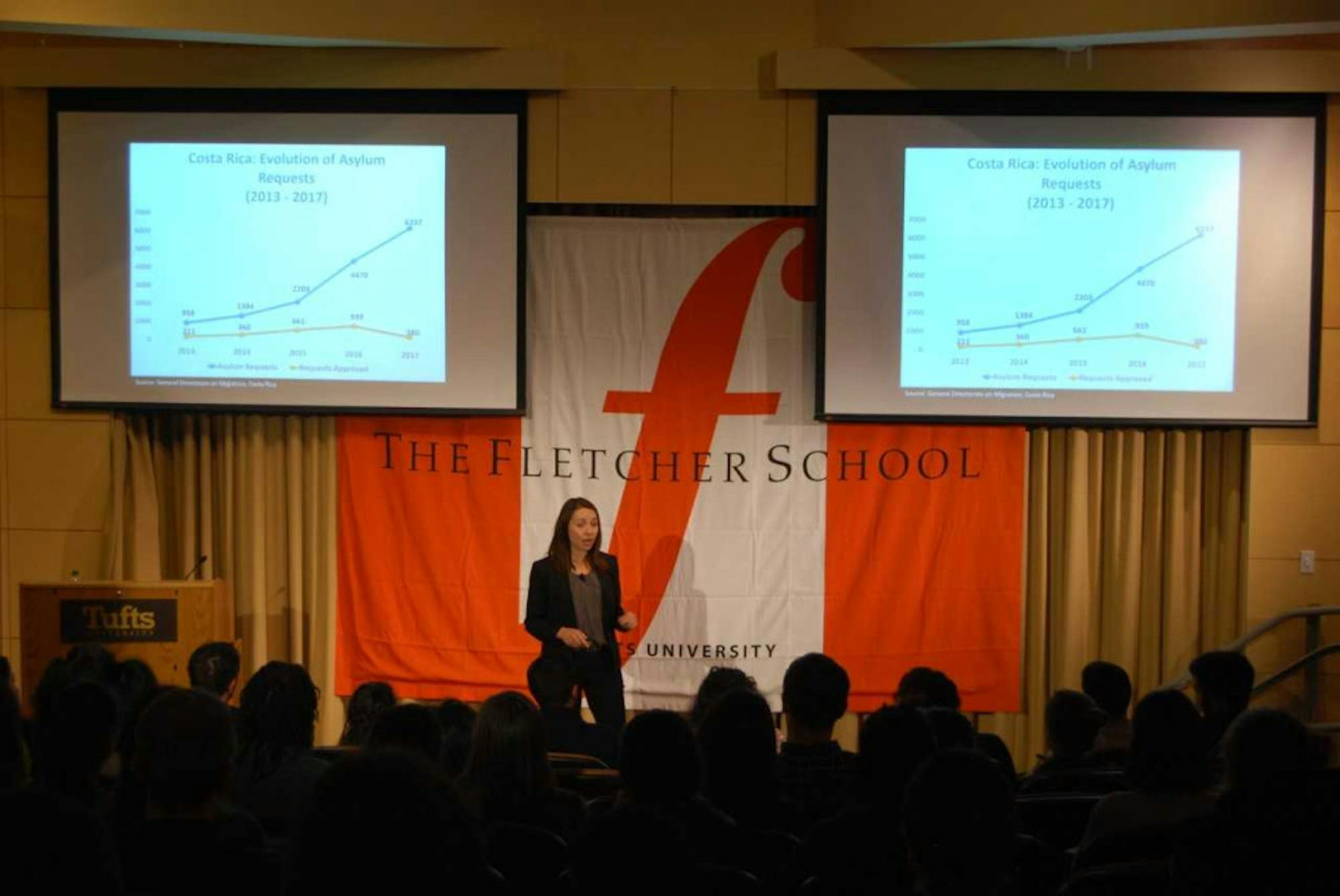The future of migration was front and center at ASEAN Auditorium Monday as nine speakers gave TED-style talks at The Fletcher School of Law and Diplomacy's Fletcher Ideas Exchange (FIE). Professor of the Practice at The Fletcher School Mihir Mankad was the master of ceremonies, and Eileen Babbitt, director of the Henry J. Leir Institute, presented the closing remarks.
This year's iteration of FIE, the fourth since its 2015 inception, was sponsored by the Henry J. Leir Institute and the Edward R. Murrow Center for a Digital World, with the financial support of the Carnegie Corporation of New York, according to its website.This year's theme was "Migration in 2030: Imagining the Possibilities." Each speaker had nine minutes on the stage.
Henry J. Leir Professor in Global Migration Karen Jacobsen delivered a speech titled “The future of migration: urbanization, technology and inclusivity.” She focused on how technological advancements, like the smartphone, have enabled mass migration.
"Smartphones really transform the way migration happens," she said. "If you have a smartphone, it will help you figure out your route, it will help you access a smuggler [or] transfer money -- it will help you migrate.”
Jacobsen also said that networks between people facilitate migration.
“If you have a family or some kind of connection in another country, that network connection will enable you to move and settle in that location,” she said.
Sasha Chanoff (F ’04, N ’04), founder and executive director of the refugee-assistance nonprofit RefugePoint, delivered a speech on “A new pathway for humanitarian response.” Chanoff, who graduated with a Master of Arts in Humanitarian Assistance from The Fletcher School and Friedman School of Nutrition Science and Policy, said that helping refugees become self-reliant is a key to the future of humanitarian response.
“Refugees are shackled into a life of dependence and forced to survive on dwindling food and aid without any opportunity to use their skills productively ... this is a catastrophic waste of human potential," he said.
Victoria Kulesza, a first-year Master of International Business candidate at The Fletcher School, followed with her talk, titled, “Giving back, not giving in: how asylum repairs crumbling communities.” She shared the impact of local migrant communities in Detroit.
“Each and every one of these [migrant] groups has come together to Detroit, fixing our broken and stagnant communities in the metropolitan area [and] filling in the gaps with a wealth of outside knowledge, new perspectives and innovation,” Kulesza said.
Graeme Rodgers, a technical advisor for research at the International Rescue Committee, discussed how refugees are made visible through research and data in a speech titled “Data, humanitarian practice and refugee ‘visibility’ in 2030.” He said that a lot of his work is mediating discussions between the humanitarian community and research.
“The ways we configure refugees through research are changing and these changes have implications in the way we represent refugees and as a result the way we respond to their plight," he said.
Echoing the importance of migrant communities, Katrina Burgess, associate professor of political economy at The Fletcher School, focused on the effects of U.S. migration policy.
“Since the 1990s, the U.S. government has fortified the border, invested billions of dollar in personnel and technology and raided homes ... to deport long-time residents,” she said. “At first it appears that these policies are working ... but even at their current level they do more harm than good.”
Other speakers at the event included: Anita Häusermann Fábos, associate professor of international development and social change at Clark University; Alfred Babo, assistant professor of sociology and anthropology at Fairfield University; Kim Wilson, lecturer in international business and human security at The Fletcher School; and Maria Teresa Nagel,a second-year Master of Arts in Law and Diplomacy candidate. All four speakers provided new perspectives on the lives of migrants domestically and their plight at the international level.
Speakers talk migration, tech, policy at Fletcher Ideas Exchange

Maria Teresa Nagel, a second-year Master of Arts in Law and Diplomacy candidate, speaks at the Fletcher Ideas Exchange forum on Nov. 5.





